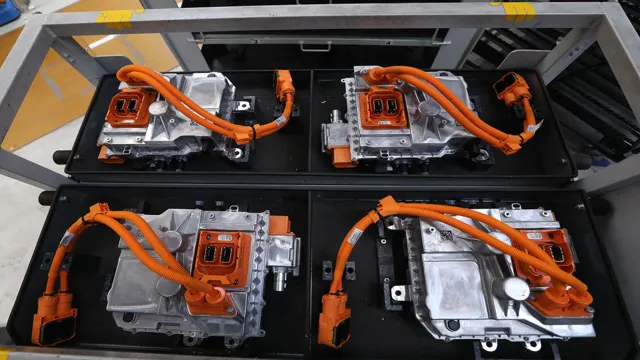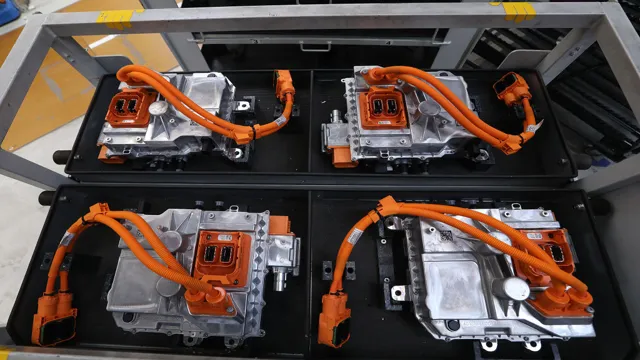Unleashing the Potential: Discovering the Long Battery Lifetimes of Electric Cars
Electric cars are becoming more and more popular as the world shifts towards sustainable energy. However, many potential buyers are still skeptical about the longevity of the batteries that power these vehicles. After all, nobody wants to invest in an expensive electric car only to have the battery fail prematurely.
So, how long do electric car batteries actually last? The answer isn’t as simple as you might think.
Factors Affecting Battery Life
Battery lifetimes of electric cars are dependent on a number of factors. Firstly, the type of battery used can play a crucial role. Lithium-ion batteries are typically used in electric cars and can last for several years depending on usage.
The temperature at which the battery operates also has an impact on its lifespan. As electric car batteries generate heat during operation, high temperatures can cause the battery to degrade faster. How often and quickly the battery is charged can also have an effect on the battery’s lifespan.
More frequent and rapid charging can lead to a shorter battery life than slower charging. Additionally, individual driving habits can impact battery life as well. Aggressive driving, frequent hard braking, and constant hard acceleration can all cause undue stress on the battery, leading to a shorter lifespan.
Overall, it’s important to consider these factors carefully and take steps to prolong the life of an electric car battery.
Charging Frequency and Method
When it comes to extending the lifespan of your battery, the frequency and method of charging plays a significant role. Lithium-ion batteries, which are commonly used in smartphones and laptops, have a limited lifespan, and they lose their capacity over time due to a variety of factors. One important factor to consider is how frequently you charge your device.
Overcharging your battery can cause it to degrade quickly, especially if you keep it plugged in for long periods. Additionally, using fast chargers that supply high current can also damage your battery. It’s best to use a charger that’s designed for your device and avoid overnight charging whenever possible.
Another factor to consider is how you charge your device. Experts suggest avoiding frequent partial charges and instead opting for full charges whenever possible. Doing so can help prolong your battery’s lifespan and ensure that it performs optimally for a longer period of time.
Ultimately, the key to extending the lifespan of your battery is to approach charging strategically and avoid damaging its delicate components.
Driving Habits and Conditions
When it comes to the life of your vehicle’s battery, your driving habits and conditions can have a significant impact. Factors such as frequent short trips, extreme temperature changes, and heavy electrical usage can all contribute to a shortened battery life. Short trips don’t give your battery enough time to fully charge, leaving it drained over time.
Extreme temperatures, whether hot or cold, can also take a toll on your battery, causing it to work harder and wear down faster. And if you use a lot of electrical components, such as air conditioning or audio systems, this can drain your battery even faster. To extend the life of your battery, try taking longer trips, keeping electrical usage to a minimum, and parking your car in a protected area to shield it from extreme temperatures.
By doing so, you can help ensure that your battery lasts for as long as possible.
Battery Type and Size
When it comes to battery life, several factors come into play, including the type and size of the battery. Different battery types have different lifespans, which can vary based on usage and charging habits. Lithium-ion batteries, for example, are commonly used in smartphones and laptops and have a lifespan of two to three years with regular use.
On the other hand, nickel-metal hydride batteries are commonly found in older electronic devices and have a shorter lifespan of less than two years. Aside from battery type, the size of the battery also plays a role in its lifespan. Generally, larger batteries will last longer than smaller ones, as they have a higher energy capacity.
However, it’s essential to note that larger batteries can also mean a longer charging time and a heavier device. Ultimately, taking care of your device’s battery by avoiding extreme temperatures and regularly updating software can help prolong its lifespan regardless of its type or size.
Average Lifetime of Electric Car Batteries
Battery lifetimes of electric cars vary depending on a variety of factors such as usage and maintenance. The average lifetime of an electric car battery can range between 8 to 10 years. However, this lifespan is dependent on how well the battery is taken care of.
Poor maintenance can decrease the lifetime of the battery by up to 30%. Good maintenance practices include avoiding overcharging the battery and keeping it within a certain temperature range. It is also important to note that battery technology is constantly improving, so the newer models of electric cars have better battery lifespan.
Furthermore, the type of battery used in the electric car also affects its lifetime. Lithium-ion batteries are the most common type of batteries used in electric cars and have a lifespan of about 300,000 to 500,000 miles. To extend the battery lifetime of your electric car, it is essential to maintain it properly and ensure that it is charged correctly.
Current Industry Standards and Expectations
When it comes to the lifetime of electric car batteries, the current industry standards and expectations have come a long way. Gone are the days when electric car batteries would barely last a few years before needing to be replaced. Nowadays, the average lifetime of electric car batteries has significantly improved and can last up to 10 years or even longer, depending on usage and maintenance.
Of course, this also depends on the technology used and the type of electric car in question. For instance, the popular Tesla Model S can go up to 300,000 miles before needing a battery replacement. This is a testament to the advancements made in battery technology, which have made electric cars more efficient and reliable than ever before.
As renewable energy becomes increasingly mainstream, it’s no surprise that electric car batteries will continue to evolve and improve, resulting in even longer lifetimes and even more sustainable driving options for years to come.
Real-World Data and User Experience
As the demand for electric vehicles (EVs) continues to increase, the average lifetime of electric car batteries has become a significant topic of discussion among potential consumers. It’s important to understand that the lifespan of an EV battery largely depends on several factors, such as the make and model of the vehicle, usage patterns, driving conditions, and frequency of maintenance. However, on average, most modern EV batteries can last anywhere from 10 to 20 years or 100,000 to 200,000 miles depending on the model and type of battery chemistry used.
The lithium-ion battery, which is the most commonly used battery in EVs, has a lifespan of roughly 8-10 years or 100,000 miles before a noticeable decrease in performance, which means that it would require replacement. However, it’s essential to note that a battery’s degradation rate declines over time, as the battery ages, the capacity of the battery drops slower than for the first few years. Therefore, the overall lifespan of an EV battery lies between 5 to 20 years or overall mileage of 100,000 to 300,000 KM.
Maintenance and regular checks of the battery can extend the battery’s life up to an extra year or two. Additionally, most manufacturers offer an extended battery warranty period, which covers battery replacement if it fails to meet a specific performance level. As EV technology continues to advance, the lifespan of electric car batteries is expected to increase.
Tips for Extending Battery Lifetime
Electric cars have become popular due to their environmental friendliness and fuel efficiency. However, the battery lifetimes of electric cars can be a source of anxiety for many drivers. There are various tips that can be employed to prolong the battery lifespan of electric cars.
One of the easiest ways is to reduce the amount of time spent charging the battery. This can be done by avoiding excessive use of air conditioning or heating systems and minimizing the use of high power-consuming functions such as radios and mobile devices. Another effective way to extend battery lifetime is to avoid overcharging the battery.
It is always advisable to unplug the charger once the battery is fully charged. Additionally, regular maintenance of the car’s battery and checking for voltage levels will help to ensure optimal performance. By following these simple tips, electric car owners can extend their battery lifetimes and get the most out of their environmentally friendly vehicles.
Maximizing Range and Efficiency
If you’re an electric vehicle owner, you likely know that the battery life is everything. Maximizing your range and efficiency can make all the difference in how far you can travel on a single charge. Luckily, there are plenty of tips and tricks to help extend your battery lifetime.
For starters, it’s essential to avoid rapid charging whenever possible, as this can significantly reduce your battery capacity over time. Additionally, keeping your vehicle in a cool, dry place can further enhance its battery life. Another effective approach involves keeping your speed steady and avoiding sudden braking or acceleration.
By driving more smoothly, you’ll use less energy and reduce the strain on your battery, helping it last longer. Finally, if you’re not using your vehicle, it’s best to keep it plugged in. This will help keep your battery in good health and prevent it from draining too quickly.
With these tips in mind, you can ensure that your electric vehicle’s battery lasts as long as possible, giving you the range and efficiency you need to enjoy the full benefits of electric driving.
Proper Battery Maintenance and Care
Proper battery maintenance and care are crucial if you want to extend the lifetime of your battery. Neglecting your battery can lead to a lot of problems, including reduced battery capacity, lower performance, and shorter lifespan. However, with some simple tips and tricks, it’s possible to keep your battery in top shape and maximize its lifespan.
One of the best things you can do to extend your battery lifetime is to avoid keeping it fully charged all the time. Overcharging can lead to heat and stress on the battery, which can significantly reduce its lifespan. So, it’s important to unplug your charger when the battery is fully charged.
Another tip for extending your battery lifetime is to avoid extreme temperatures. High temperatures accelerate the aging process of the battery, while low temperatures decrease its performance. So, it’s best to keep your battery in a cool and dry place to avoid any potential problems.
Moreover, it’s important to use the right charger for your battery. Using a low-quality or incompatible charger can cause overcharging or undercharging, which can significantly affect the battery’s lifespan. Finally, it’s important to regularly clean your battery.
Dust and debris can accumulate on the battery, reducing its performance and lifespan. So, it’s important to clean it regularly with a dry cloth. In conclusion, proper battery maintenance and care are crucial if you want to extend your battery lifetime.
By following these simple tips and tricks, you can keep your battery in top shape and maximize its lifespan. So, don’t neglect your battery, take care of it, and it will take care of you!
Future Developments in Electric Car Batteries
As the demand for sustainable transportation continues to grow, electric cars are becoming more prevalent on the roads. One area of concern for electric car owners is the battery lifetimes of their vehicles. However, there are exciting developments happening in the field of electric car batteries that could alleviate those worries.
Scientists are exploring the use of solid-state lithium-ion batteries instead of the traditional liquid ones. These solid-state batteries are safer, more energy-dense, and have longer lifetimes than their liquid counterparts. Another development is the use of silicon for anodes in batteries, which could significantly increase their capacity and potentially extend electric car ranges.
Additionally, advancements in recycling technology could make electric car batteries more sustainable, reducing their environmental impact. As we look to the future, electric car battery technology continues to evolve, and we can expect to see longer lifetimes, greater performance, and improved sustainability in the batteries of the electric cars of tomorrow.
Conclusion
In conclusion, the battery lifetime of electric cars has come a long way from its infancy. As technology improves, so does the longevity of the battery. However, it is important to remember that just like with any relationship, the battery-car dynamic requires maintenance and care in order to flourish.
So charge up, take care of your car, and watch as your electric love affair lasts a lifetime.”
FAQs
What is the average lifespan of a battery in an electric car?
The average lifespan of a battery in an electric car ranges from 8 to 10 years or approximately 100,000 miles.
Is it possible to replace the battery in an electric car?
Yes, it is possible to replace the battery in an electric car, but it can be expensive, costing anywhere from $3,000 to $20,000.
Does the battery life of an electric car vary based on the model and make?
Yes, the battery life of an electric car can vary based on the model and make of the car. Some models have batteries that can last longer than others.
How can I extend the battery life of my electric car?
You can extend the battery life of your electric car by avoiding extreme temperatures, avoiding rapid charging, and regularly maintaining the battery.





